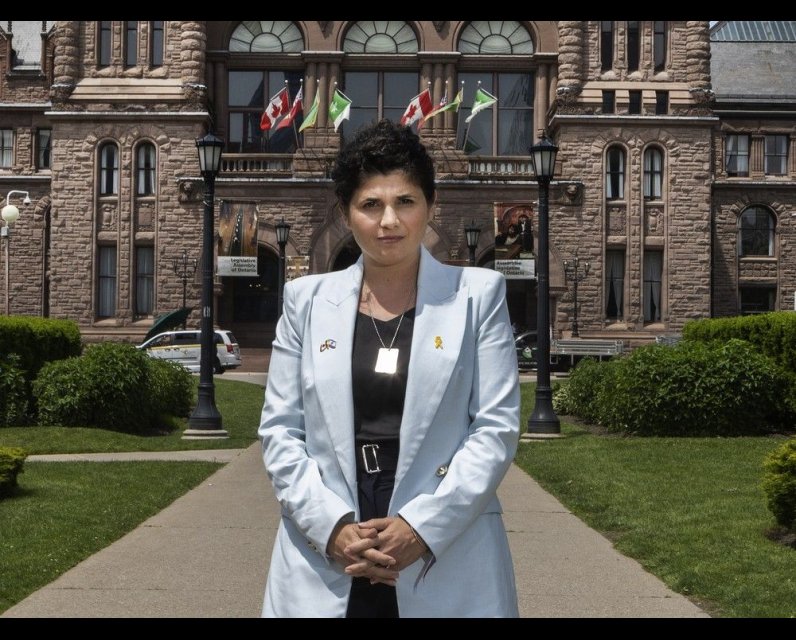Source Feed: National Post
Author: Rahim Mohamed
Publication Date: June 23, 2025 - 20:18
'Read a few more history books,' Canada-born Israeli minister advises millennials uneasy with Iran war
June 23, 2025

OTTAWA — One of Israeli’s highest-ranking politicians says she understands that many people could be feeling déjà vu as the West faces another war in the Middle East over the threat of weapons of mass destruction.
The Toronto-born Sharren Haskel, now Israel’s junior minister of foreign affairs, was herself a young enlistee in Israel’s armed forces (specifically the border police) when then U.S. president George W. Bush and a coalition of allies invaded Iraq in 2003, vowing to destroy weapons of mass destruction, that were later found to be non-existent.
And she’s not a fan of war, she said.
“I’ve seen things that I don’t wish anyone to see,” Haskel, 41, told National Post on Monday.
“I’ve been in positions that I would never want my own daughters to be in.”
But public opinion studies have documented
an “Iraq War hangover”
driving anti-war attitudes among millennials, born between 1981 and 1996.
A 2019 Ipsos study study tracking
more than 16,000 millennials
across 16 countries, including the U.S., found that three-quarters believed that most wars could be avoided. Respondents from war-affected countries were more hopeful than others that future wars could be avoided.
But Haskel said that Iran poses a much graver threat today than Iraq did two decades ago.
“The two cases are extremely different,” she said, noting that Iran’s advanced
nuclear enrichment and ballistics missile programs
have been well-documented by several international bodies and governments, and that they pose a “double existential threat” to international security.
Prior to this month’s Israel and U.S.-led attacks on Iranian nuclear sites, the International Atomic Energy Agency (IAEA) estimated that Iran
had enough raw material
for nine nuclear weapons.
Haskel said that the fear of a repeat of the disastrous Iraq war has made the U.S. and other Western countries too hesitant to use force against an intransigent Iran.
“We’ve seen in recent years, and because of (Iraq), how the international community have been chasing up a diplomatic solution,” said Haskel.
“But unfortunately, this enemy that you’re facing was growing to a monstrous size while deceiving the international community.”
Iran signed what looked to be a breakthrough nuclear deal with the U.S. and other world powers in 2015, but it has
repeatedly violated the terms
of this agreement. The
IAEA reported in 2023
that Iran’s stockpile of enriched uranium was 30 times more than the maximum permitted under the agreement.
Haskell encourages younger adults who were hung up on the surface-level similarities to 2003 invasion of Iraq to take a longer view of history.
“I would try and lead them to spend a little less time on social media and read a few more history books. In particular, books about the years leading up to the Second World War,” said Haskell.
“When people say that history repeats itself, it’s very clear during these times as well … the European countries (after the First World War) were so desperate to avoid another world war that they tried to convince themselves that what the Nazis were saying wasn’t really what they were saying.”
One prominent politician who’s given voice to his generation’s war-skeptical sentiment is 40-year-old U.S. Vice President JD Vance.
Vance, who was deployed to Iraq in 2005,
later called the war “disastrous.”
He’s since called for the U.S. to limit its exposure to foreign conflicts, such as
Russia’s invasion of Ukraine
.
The vice president said over the weekend, after the U.S. bombed
three Iranian nuclear sites
, that the U.S. was not at war with Iran but “
with Iran’s nuclear program
.”
Haskel said she didn’t have a problem with Vance’s description of the U.S.’s involvement in Iran.
“I think you should ask the Americans to make the Americans’ case,” said Haskel.
National Post
rmohamed@postmedia.com
At the age of 29, Ophelia Maestrado made the difficult choice to leave her husband and three young children in the Philippines to chase a dream in Canada.
June 24, 2025 - 05:00 | Globalnews Digital | Global News - Canada
// custom header art
window.tgam.meta.photo_desktop = "https://www.theglobeandmail.com/resizer/v2/3OHHVEBVHRAATE66SLAPEV5U5A.jpg?auth=55d4775e7c9c7edf4a89bfc3ed99193f902da40ddc2dcde42af7704824c25660&width=1800&quality=80";
window.tgam.meta.photo_mobile = "https://www.theglobeandmail.com/resizer/v2/3OHHVEBVHRAATE66SLAPEV5U5A.jpg?auth=55d4775e7c9c7edf4a89bfc3ed99193f902da40ddc2dcde42af7704824c25660&width=1800&quality=80";
window.tgam.meta.video = "";
window.tgam.meta.caption = "Marion Barron and Gary Nickerson stand at the door of Gary's Fresh Seafood Truck in Halifax.";...
June 24, 2025 - 04:30 | Dakshana Bascaramurty | The Globe and Mail
A little over a decade ago, much of what’s now the thriving communities of Bradley Estates, Trailsedge and Avalon Encore was still open farmland. Curiously, Ottawa’s 2013 Transportation Master Plan (TMP) had almost nothing to say about our area — aside from a modest two-lane road that became Brian Coburn Boulevard and a long-proposed placeholder for the Cumberland Bus Rapid Transitway, first floated in 1999 and still unbuilt. There was no commitment to the kind of investment our future growth would demand. Read More
June 24, 2025 - 04:15 | Christina Spencer, Ottawa Citizen | Ottawa Citizen


Comments
Be the first to comment